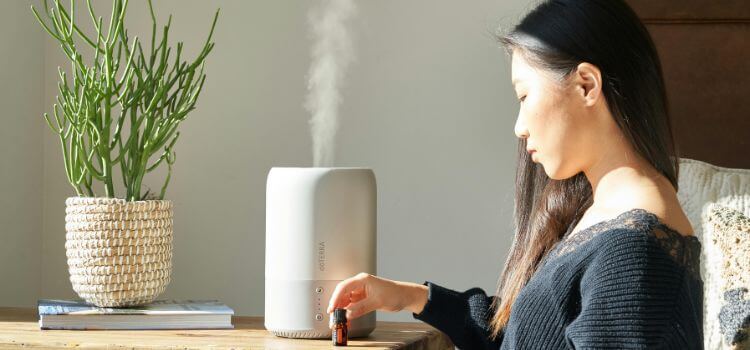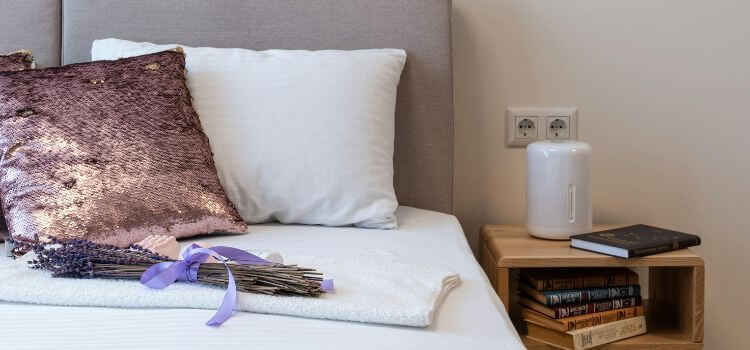As an Amazon Associate, I earn from qualifying purchases

Yes, FSA covers humidifiers. A flexible spending account (FSA) can cover the cost of a humidifier if a healthcare professional prescribes it as a medical necessity.
A humidifier is An apparatus that adds more moisture to the air, which can help alleviate symptoms of dry skin, allergies, asthma, and other respiratory conditions. If you have an FSA, you can use the funds to purchase a humidifier for medical purposes.
However, it’s important to note that not all humidifiers qualify for FSA coverage. Consult your healthcare physician and review your FSA plan details to ensure reimbursement eligibility. Understanding your humidifier FSA coverage can help you make wise choices for maintaining your fitness and health.
Eligibility Of Humidifiers For FSA Reimbursement
Humidifiers are eligible for FSA reimbursement if they are medically necessary for a specific condition. You need a prescription from a healthcare provider to qualify for FSA coverage. Check with your FSA provider for specific eligibility requirements.
Criteria For FSA Eligible Expenses
For a humidifier to be eligible for reimbursement through a Flexible Spending Account (FSA), it must fulfill particular requirements outlined by the Internal Revenue Service (IRS).
- Medical Necessity: A healthcare provider must prescribe humidifiers to treat a medical condition such as asthma or allergies.
- Documentation: Keep a copy of the prescription and a detailed receipt as proof of the medical necessity.
- Cost: The cost of the humidifier should be the usual and customary price for similar items in your area.
Humidifiers Under FSA: General Rules
Knowing the general rules for FSA-eligible expenses is essential when considering purchasing a humidifier with FSA funds.
- Reimbursement: You can seek reimbursement for the cost of a humidifier if it meets the medical necessity criteria.
- Over-the-counter humidifiers are eligible for FSA reimbursement only if a healthcare provider prescribes them.
- Submission: Submit the necessary documentation and the FSA claim form to your plan administrator for reimbursement.
Understanding Flexible Spending Accounts
How Do You Interpret an FSA?
An Account for Flexible Spending, or FSA, is a tax-advantaged savings account employers offer to help employees save on eligible medical expenses.
How FSAs Work
Part of the pre-tax income of employees may be contributed. Earnings into an FSA can then be used to help pay for appropriate medical costs, such as doctor visits, prescription drugs, and even specific medical devices, such as humidifiers.
Medical Devices And FSA Coverage

Explore FSA coverage for medical devices like humidifiers. Verify if your FSA plan includes humidifier expenses.
Medical Devices and FSA Coverage Medical devices such as humidifiers can be vital for keeping a healthy home environment, particularly for those who have respiratory issues or allergies. Many wonder if their Flexible Spending Account (FSA) covers the cost of the humidifier. Here, we will explore the eligibility of medical devices under FSA coverage, focusing on the subheading: Medical Devices and FSA Coverage.
Types Of FSA-eligible Medical Devices
FSA-eligible medical devices encompass many products designed to address specific medical needs. These may include blood pressure monitors, wheelchairs, heating pads, glucose monitors, and nebulizers. Additionally, certain types of humidifiers may also qualify as FSA-eligible medical devices if they are deemed medically necessary.
The Role Of Medical Necessity
Regarding FSA coverage for medical devices, the critical factor is medical necessity. According to Internal Revenue Service (IRS) regulations, a medical device must primarily alleviate or prevent a medical condition for a medical device to be considered FSA-eligible. Therefore, if a healthcare provider deems a humidifier necessary to mitigate a respiratory condition such as asthma or allergies, it may be eligible for FSA coverage. In conclusion, individuals with FSAs should consult their healthcare provider and FSA plan guidelines to determine if a humidifier or other medical device is eligible for coverage. Understanding the types of FSA-eligible medical devices and the role of medical necessity can help individuals make informed decisions about utilizing their FSA funds for essential medical devices.
The Specifics Of Humidifiers And Fsa
When managing your health, you must consider all the available tools and resources. Investing in a humidifier can benefit those trying to get better or have respiratory problems with air quality in their homes. But does FSA cover humidifiers? Let’s explore how your Flexible Spending Account (FSA) may apply to purchasing a humidifier.
When Are Humidifiers Covered?
Humidifiers are typically covered by an FSA when they are deemed necessary for treating a specific medical condition. This can include respiratory ailments, allergies, or other health issues that may be alleviated or improved by using a humidifier. However, it’s essential to note that not all humidifiers may qualify for reimbursement, so it’s crucial to consult your FSA plan guidelines for specific details.
Documentation Required For Reimbursement
Documentation is critical when seeking reimbursement for a humidifier purchase through your FSA. To qualify, you may need to provide a Letter of Medical Necessity (LMN) from a healthcare provider outlining the medical condition for which the humidifier is prescribed. Additionally, a detailed receipt or invoice indicating the purchase of the humidifier and its cost may be required for reimbursement.
How To Purchase A Humidifier With FSA Funds
When purchasing a humidifier with your FSA funds, it’s essential to understand the process and requirements. Using your FSA for a humidifier can be a convenient way to improve the air quality in your home while maximizing your healthcare benefits. This post will walk you through buying a humidifier with your FSA funds, including finding FSA-approved retailers and the necessary steps to utilize your FSA.
Finding Fsa-approved Retailers
Finding FSA-approved retailers is crucial before purchasing a humidifier with your FSA funds. These retailers can accept FSA payments for eligible medical expenses, including humidifiers. To ensure you’re buying from an approved vendor, check the FSA’s official website or contact your FSA administrator for a list of approved retailers.
Steps To Use FSA for Humidifiers
Once you’ve identified FSA-approved retailers, the next step is to follow the process for using your FSA funds to purchase a humidifier. Here’s a simple guide to help you navigate the process:
- Check your FSA balance: Before making the purchase, verify the available funds in your FSA. Check your account to ensure you have enough money to cover the cost of the humidifier.
- Choose an eligible humidifier: Select one that meets the FSA guidelines for eligible medical expenses. This typically includes devices designed to alleviate specific medical conditions related to respiratory health.
- Make the purchase: Complete the transaction with the FSA-approved retailer, ensuring the payment is processed using your FSA debit card or submitting a reimbursement claim with proper documentation.
- Keep records: Keep all invoices and supporting paperwork for the humidifier purchase, as these may be required for verification or reimbursement purposes.
Maximizing Your FSA Benefits

Planning For Eligible Expenses
When maximizing your FSA benefits, planning for eligible expenses is crucial. Humidifiers can be a qualifying expense under your FSA, helping you manage respiratory issues and allergies and enhancing your home’s air quality. By including a humidifier in your FSA spending plan, you can make the most of your tax-advantaged funds while ensuring a healthier living environment for you and your family.
Avoiding FSA Penalties And Losses
Understanding what your FSA covers and avoiding penalties and losses is essential. If you use your FSA funds for ineligible expenses, you risk facing penalties and potential loss of funds. By ensuring that the purchase of a humidifier falls within the guidelines set by the FSA, you can avoid these issues and make the most of your FSA benefits.
Common Misconceptions About FSA Coverage
Common misconceptions about FSA coverage can lead to confusion regarding understanding what is covered. It’s important to debunk myths and clarify the facts to make informed decisions about utilizing your FSA benefits.
Myths About FSA Restrictions
1. FSA covers only medical expenses
2. FSA cannot be used for over-the-counter items
3. FSA has strict limitations on eligible products
Humidifiers: Luxury Or Necessity?
Humidifiers can be both a luxury and a necessity for health benefits. They can help with respiratory issues. They enhance indoor air quality, making them an excellent investment for overall well-being.
Navigating FSA Claims And Reimbursements
Discover how to navigate FSA claims and reimbursements for humidifiers. Learn if FSA covers the cost of humidifiers and how to submit claims for reimbursement, ensuring you make the most of your FSA benefits. Understand the process and requirements to maximize your FSA coverage for humidifiers.
Submitting A Claim For A Humidifier
Troubleshooting Common Issues
Navigating FSA Claims and Reimbursements Humidifiers can be an essential purchase for maintaining healthy indoor air quality. If FSA covers humidifiers, the answer is yes. To make the most of your FSA benefits for a humidifier purchase, it’s crucial to understand the process of submitting a claim and potential issues that may arise.
Submitting a Claim for a Humidifier To submit a claim for a humidifier through your FSA, follow these simple steps:
1. Purchase: Buy a qualifying humidifier that meets the FSA guidelines for eligible expenses.
2. Receipt: Keep the receipt from your humidifier purchase as proof of the expense.
3. Claim Form: Fill out the necessary FSA claim form provided by your FSA administrator.
4. Documentation: Attach the receipt and any other required documentation to the claim form.
5. Submission: Submit the completed claim form and documentation to your FSA administrator for reimbursement.

Troubleshooting Common Issues: Encountering issues with your FSA claim for a humidifier? Here are some common problems and solutions:
– Denied Claim: Should your claim be rejected, review the FSA guidelines to ensure your humidifier purchase meets the eligibility criteria.
– Missing Documentation: Ensure you have all the required documentation, including the receipt, to support your claim.
– Reimbursement Delay: Contact your FSA administrator to inquire about the status of your reimbursement if there is a delay. Following these steps and troubleshooting common issues, you can successfully navigate FSA claims and reimbursements for your humidifier purchase.
Frequently Asked Questions
Yes, you can use your FSA card to purchase a humidifier. It’s an eligible expense under the FSA guidelines.
Yes, dehumidifiers are FSA-eligible if prescribed by a healthcare provider for a specific medical condition.
FSA may cover air purifiers if a doctor prescribes them for a specific medical condition. However, it depends on the FSA plan and the air purifier model. It is best to check with the FSA provider for coverage details.
A vaporizer is FSA-eligible if a healthcare provider prescribes it for a medical condition.
Conclusion
Understanding FSA coverage for humidifiers is essential for your health needs. Explore options with your provider to make the most of your benefits. Stay informed and prioritize your well-being. Your comfort and respiratory health matter. Make informed decisions for a healthier lifestyle.
As an Amazon Associate, I earn from qualifying purchases
Leave a Reply